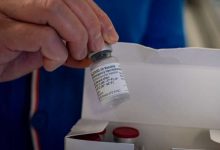Health Canada authorizes Pfizer vaccine for adolescents

Health Canada offered parents anxious about their unvaccinated children some fresh hope today by clearing the Pfizer-BioNTech COVID-19 vaccine for use in people as young as 12 years old.
Health Canada approves Pfizer COVID-19 vaccine
After reviewing clinical trial data submitted by the New York-based company last month, regulators have determined the mRNA shot is safe to use in people 12 to 15 years of age. The previous age cutoff for the vaccine was 16.
The Pfizer vaccine is the first product to be authorized for use in this younger age category. The three other products authorized for use in Canada — AstraZeneca, Johnson & Johnson and Moderna — can be given only to people over the age of 18 for now.
Dr. Supriya Sharma, the chief medical adviser at Health Canada, called the new authorization “a significant milestone in Canada’s fight against the pandemic” and said it could allow young people to safely return to school and extracurricular activities.
Pfizer enrolled 2,000 adolescents between the ages of 12 to 15 in its U.S.-based trial, giving half that group a placebo and the other cohort the same vaccine that is used in adults.
None of the adolescents in the clinical trial who received the vaccine developed symptomatic infections, a sign of significant protection. In the group that did not receive the vaccine, there were 18 cases of COVID-19.
Strong antibody responses
The vaccinated adolescents also produced strong antibody responses and experienced roughly the same side effects seen in people ages 16 to 25. The most commonly reported side effects were temporary and mild, like a sore arm, chills or fever, Sharma said.
Sharma said it’s crucial to get this younger demographic vaccinated because up to 20 per cent of the COVID-19 cases reported in Canada have been among people under 19. While rare, there have also been reports of COVID-related deaths among people as young as 13.
“While younger people are less likely to experience serious cases of COVID-19, having access to a safe and effective vaccine will help to control the disease’s spread to their families and friends — some of whom may be at a higher risk of complications,” Sharma said.
“It will also support the return to a more normal life for our children, who have had such a hard time over the past year.”
Dr. Zain Chagla, associate professor of medicine at McMaster University in Hamilton, Ont., said the 12-15 age group is at “higher risk for transmission” than younger children.
“I think we would probably get to them a bit lower on the list, probably July or August, once we get second doses into more vulnerable populations,” Chagla said in an interview.
“The more people that are safely vaccinated, it allows for more places to be opened up. And I think that, especially thinking about high school plans this year and university plans this year, having that cohort really immunized is going to give some gains into making those places more safe for in-person,” he said.
While Canada is the first country in the world to authorize the Pfizer product for use among 12 to 15 years olds, the U.S. Food and Drug Administration is poised to make the shot available to this group. The New York Times has reported the FDA will expand access as soon as next week. The European Medicines Agency is also reviewing the U.S. clinical trial data.
Health Canada: AstraZeneca shot ‘very, very effective’
On Monday, the National Advisory Committee on Immunization (NACI) said viral vector COVID-19 vaccines like those offered by AstraZeneca and Johnson & Johnson are not the “preferred” products.
NACI, an independent body composed of volunteer experts, said Canadians who are less likely to contract COVID-19 may want to wait until an mRNA shot from Pfizer or Moderna is available because those products don’t carry the same risk of very rare, but serious, blood clots.
Health Canada’s Sharma said the regulators have determined all products authorized for use in Canada, including AstraZeneca, are “very, very effective” in preventing COVID-19 hospitalizations and death.
Sharma said that with Canada in the midst of a third wave of COVID-19 cases, it’s prudent for Canadians to get the first shot made available to them.
The only way to restore the “sense of normality that we’re missing so much” is to vaccinate as many people as possible to build herd immunity, Sharma said.
“Our message today is, all the vaccines offer a real benefit to prevent COVID-19. When you’re offered a vaccine, then that is a really, really good option,” Sharma said.
“You have to really weigh the risks of getting vaccinated now with the risk of potentially getting COVID-19. Even in areas where the risk is low, that risk can change very quickly.”
There is a remote possibility of developing vaccine-induced immune thrombotic thrombocytopenia (VITT) after receiving a viral vector vaccine, Sharma said, but contracting COVID-19 could also lead to serious adverse health effects and death.
She pegged the risk of developing VITT at 1 in 100,000. Less than 20 per cent of the people who developed this condition have died.
More than 24,000 Canadians have died of COVID-19 with nearly 1.3 million cases reported since the onset of this pandemic. Three Canadians have died from VITT-related complications so far, with 1.7 million AstraZeneca shots already deployed.
While the current guidance is to receive a second dose of what you were vaccinated with first, Sharma said Health Canada is monitoring a clinical trial underway in the U.K. that is mixing a viral vector shot like AstraZeneca with a second dose of an mRNA product like Pfizer.
“We’re very anxious to see the results of that, which we expect to be coming out in the next month or so,” she said, adding the trial may reveal a better immune response with no increased risk for side effects.
“Stay tuned for information.”
Nearly 35 per cent of the Canadian population has been vaccinated already with at least one dose of a COVID-19 vaccine. Millions more shots will arrive in the weeks ahead as deliveries from Pfizer ramp up significantly over the next two months.








Redes Sociais - Comentários